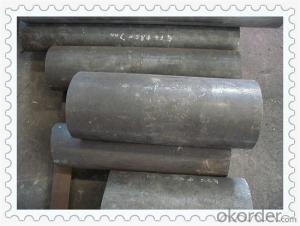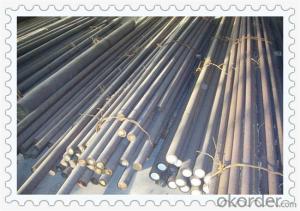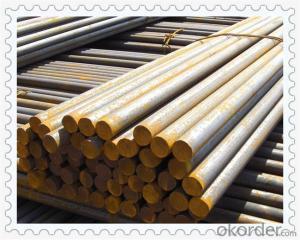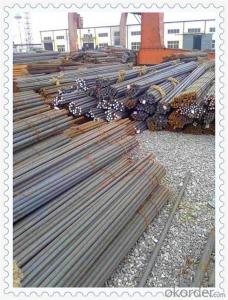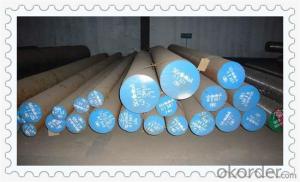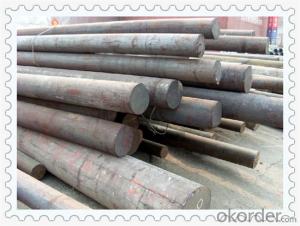Carbon Alloy Steel Round Bars AISI 4140
- Loading Port:
- China main port
- Payment Terms:
- TT OR LC
- Min Order Qty:
- 30 m.t.
- Supply Capability:
- 10000 m.t./month
OKorder Service Pledge
OKorder Financial Service
You Might Also Like
Carbon Alloy Steel Round Bars AISI 4140
Technical Paramenters
Chemical Composition | Mechanical Properties (In Quenched & Tempered State) | ||
C | 0.38-0.43 % | Tensile strength(MPA) | ≥1080(110) |
Si | 0.15-0.35% | Yield strength (MPA) | ≥930(95) |
Mn | 0.75-1.00 % | Elongation (δ5/%) | ≥12 |
Cr | 0.80-1.10 % | Reduction in Area (ψ/%) | ≥45 |
Ni | ≤0.030 % | Impact (J) | ≥ 63 |
P | ≤0.030 % | Impact toughness value αkv (J/cm2) | ≥78(8) |
S | ≤0.040 % | Hardness | ≤217HB |
Cu | ≤0.030 % | ||
Mo | 0.15-0.25 % | ||
Products Show
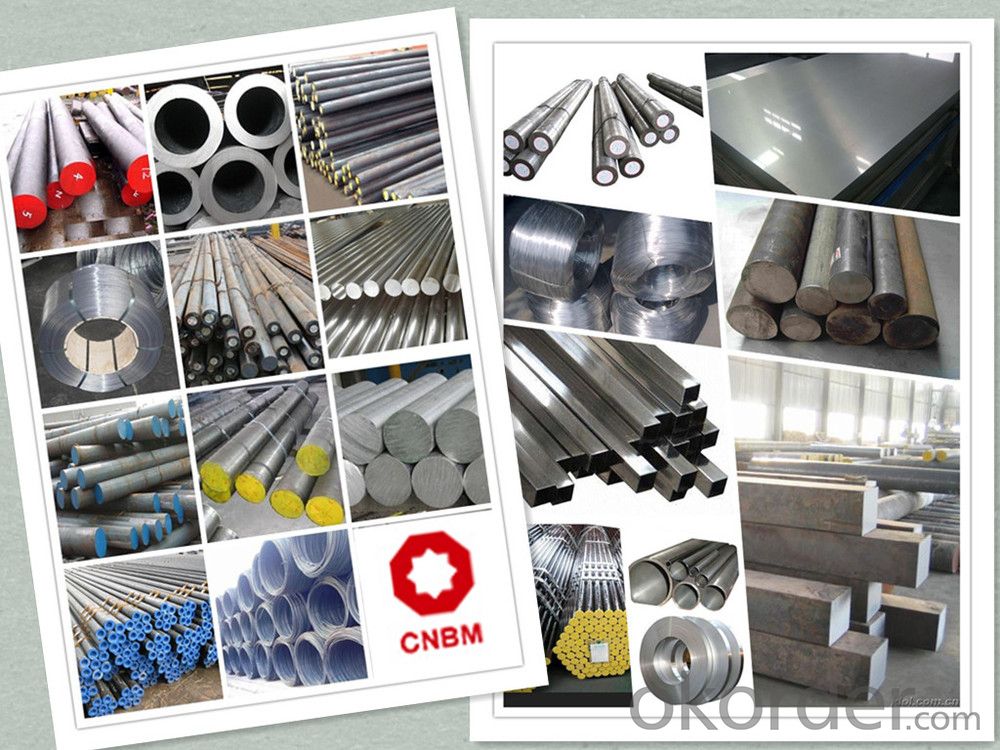
Standard Grades
Werkstoff-NO. | DIN-EN | DIN-Abbreviation | SAE/AISI |
1.1545 | 10096 | C 105 W1 | W110 |
1.1730 | 10096 | C 45 W | -- |
1.2063 | 10096 | 145Cr6 | - |
1.2067 | 10096 | 100Cr6 | L1/L3 |
1.2080 | 10096 | X210Cr12 | D3 |
1.2101 | 10096 | 62SiMnCr4 | - |
1.2210 | 10096 | 115CrV3 | L2 |
1.2363 | 10096 | X100CrMoV5 1 | A2 |
1.2379 | 10096 | X155CrVMo12 | D2 |
1.2419 | 10096 | 105WCr6 | - |
1.2436 | 10096 | X210CrW12 | D6 |
1.2510 | 10096 | 100MnCrW4 | O1 |
1.2542 | 10096 | 45 WCrV7 | S1 |
1.2550 | 10096 | 60WCrV7 | S1 |
1.2601 | 10096 | X165CrMoV 12 | - |
1.2721 | 10096 | 50 NiCr13 | - |
1.2826 | 10096 | 60MnSiCr4 | - |
1.2842 | 10096 | 90MnCrV8 | O2 |
Chemical Elements: | |||||||||||
Grade | C | Si | Mn | P≤ | S≤ | Cr | Mo | V | W | OTHER | |
1.2344/SKD61/H13 | 0.35-0.42 | 0.80-1.20 | 0.25-0.50 | 0.03 | 0.02 | 4.80-5.50 | 1.00-1.50 | 0.80-1.15 | Cu≤0.25 Ni≤0.25 | ||
4Cr5MoSiV1 | 0.32-0.42 | 0.80-1.20 | 0.20-0.50 | 0.030 | 0.030 | 4.75-5.50 | 1.10-1.75 | 0.80-1.20 | |||
1.2379/D2/SKD11 | 1.50-1.60 | 0.10-0.40 | 0.15-0.45 | 0.030 | 0.030 | 11.0-12.0 | 0.60-0.80 | 0.90-1.10 | |||
1.2510/O1/SKS3 | 0.85-1.0 | 0.10-0.50 | 1.0-1.40 | 0.030 | 0.030 | 4.75-5.50 | ≤0.30 | 0.4-0.6 | |||
1.2363/A2/SKD12 | 0.95-1.05 | 0.10-0.50 | 0.40-1.00 | 0.030 | 0.030 | 4.75-5.50 | 0.90-1040 | 0.15-0.50 | |||
4140 | 0.38-0.43 | 0.15-0.35 | 0.75-1.00 | 0.035 | 0.040 | 0.80-1.10 | 0.15-0.25 | ||||
4340 | 0.38-0.43 | 0.15-0.35 | 0.60-0.80 | 0.035 | 0.040 | 0.70-0.90 | 0.20-0.30 | Ni 1.65-2.00 | |||
P20/1.2330/M202 | 0.28-0.40 | 0.20-0.80 | 0.60-1.00 | 0.030 | 0.030 | 1.40-2.00 | 0.30-0.55 | ||||
Work Shop
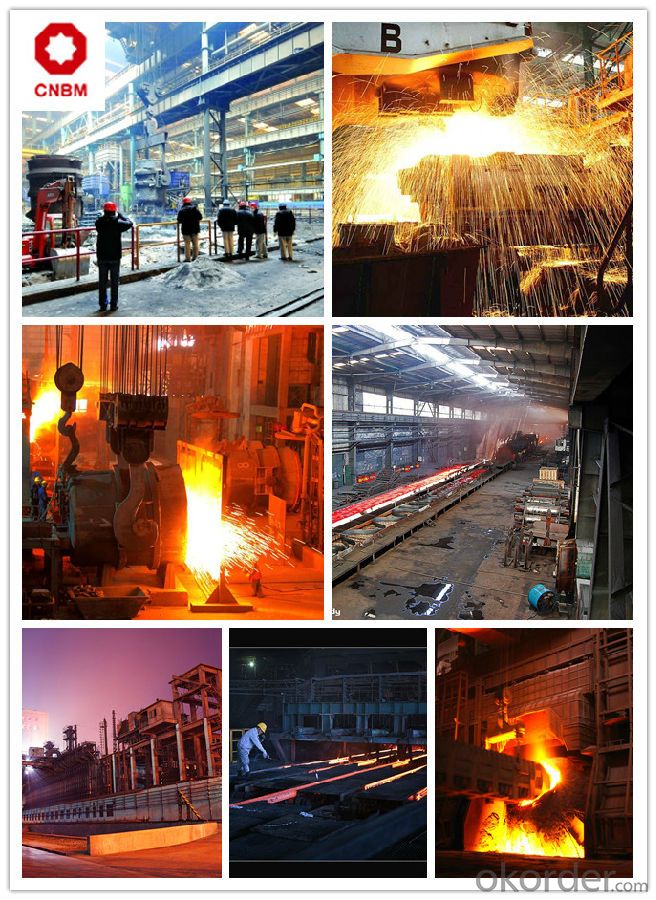
Company Information
CNBM International Corporation is the most important trading platform of CNBM group.
Whith its advantages, CNBM International are mainly concentrate on Cement, Glass, Iron and Steel, Ceramics industries and devotes herself for supplying high qulity series of refractories as well as technical consultancies and logistics solutions.

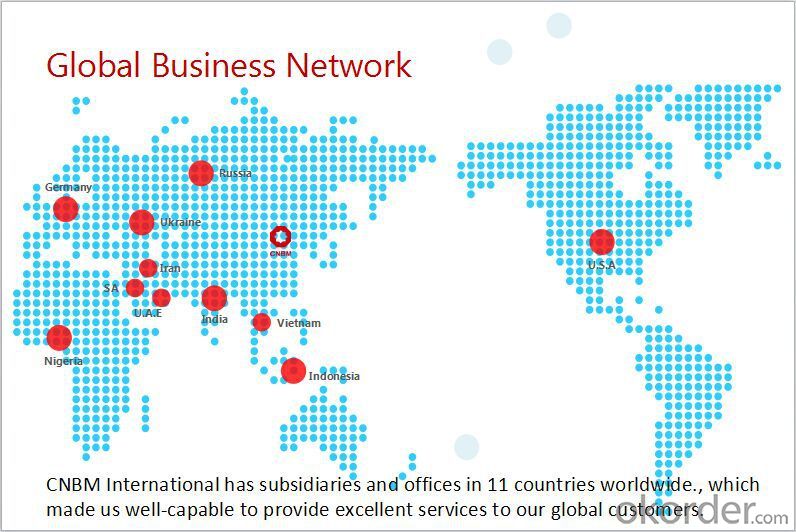
FAQ
1, Your advantages?
professional products inquiry, products knowledge train (for agents), smooth goods delivery, excellent customer solution proposale
2, Test & Certificate?
SGS test is available, customer inspection before shipping is welcome, third party inspection is no problem
3, Factory or Trading Company?
CNBM is a trading company but we have so many protocol factories and CNBM works as a trading department of these factories. Also CNBM is the holding company of many factories.
4, Payment Terms?
30% TT as deposit and 70% before delivery.
Irrevocable L/C at sight.
5, Trading Terms?
EXW, FOB, CIF, FFR, CNF
6, After-sale Service?
CNBM provides the services and support you need for every step of our cooperation. We're the business partner you can trust.
For any problem, please kindly contact us at any your convenient time.
We'll reply you in our first priority within 24 hours.
Packaging & Delivery
1, Packaging: seaworthy package or as required
2, Delivery: 35-45 days or based on quantity
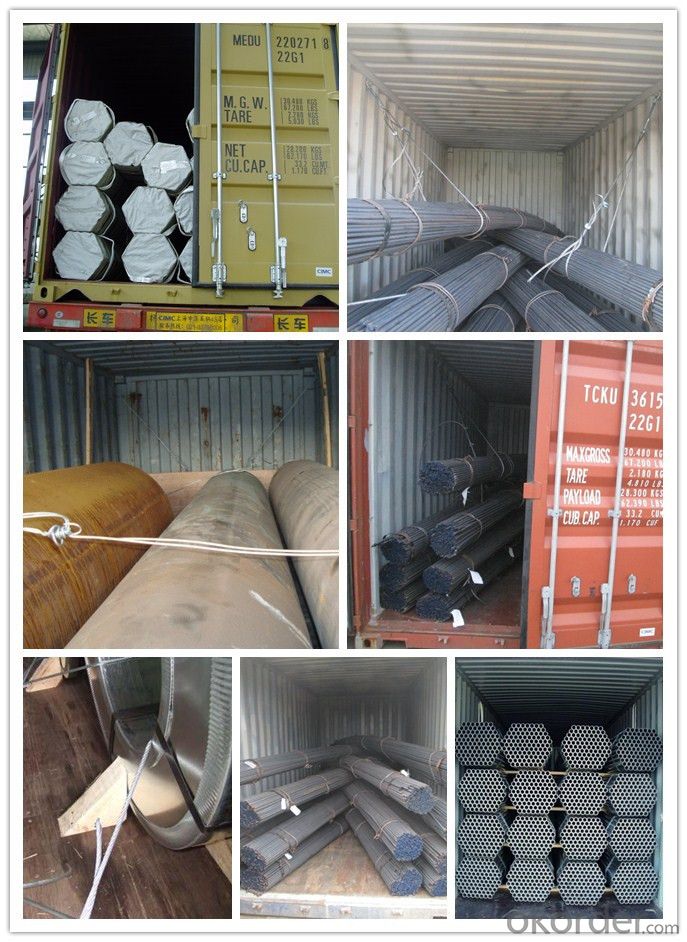
- Q:Can steel round bars be used in the manufacturing of appliances?
- Yes, steel round bars can be used in the manufacturing of appliances. Steel is a durable and versatile material that can be shaped into different forms, including round bars, which can be used for various purposes in appliance manufacturing such as structural support, handles, or components.
- Q:What are the different marking methods for steel round bars?
- There are several marking methods commonly used for steel round bars. These methods are used to identify and provide information about the steel bars, such as their specifications, grades, manufacturer, and other relevant details. 1. Stamping: Stamping is a widely used marking method in which information is imprinted onto the surface of the steel round bar using a stamping machine. This can include alphanumeric characters, symbols, or logos. Stamping provides a permanent and durable marking that is resistant to wear and corrosion. 2. Laser Marking: Laser marking is a precise and high-quality marking method that uses a laser beam to engrave information onto the surface of the steel round bar. This method allows for intricate designs, barcodes, and serial numbers to be marked. Laser marking provides permanent identification that is resistant to fading and tampering. 3. Inkjet Printing: Inkjet printing is a non-contact marking method that uses inkjet technology to print information onto the steel round bar's surface. This method is commonly used for marking barcodes, QR codes, and other data matrix codes. Inkjet printing allows for fast and efficient marking, and the ink used is designed to adhere to the steel surface effectively. 4. Etching: Etching is a chemical marking method that involves using acid or other chemicals to remove layers of the steel round bar's surface, creating a visible mark. This method is commonly used for marking logos, identification numbers, or other designs. Etching provides a permanent marking that can be easily read and is resistant to wear. 5. Color Coding: Color coding is a simple marking method that involves using paint or colored coatings to mark different types or grades of steel round bars. Each color represents a specific attribute or characteristic, such as strength, corrosion resistance, or heat resistance. Color coding provides quick and visual identification of the steel round bars. These marking methods play a crucial role in ensuring proper identification, traceability, and quality control of steel round bars in various industries such as construction, manufacturing, and engineering. The choice of marking method depends on factors such as the required level of permanence, visibility, and the specific information to be marked on the steel round bars.
- Q:Are steel round bars suitable for high-temperature applications?
- Yes, steel round bars are suitable for high-temperature applications. Steel is known for its excellent strength and heat resistance, making it a reliable choice for various industries that require materials capable of withstanding elevated temperatures. Steel round bars can maintain their structural integrity and mechanical properties even under extreme heat conditions, making them a popular choice for applications such as furnace components, heat exchangers, and high-temperature machinery.
- Q:What is the maximum elongation of steel round bars?
- The maximum elongation of steel round bars may vary based on the particular grade and composition of the steel. Nonetheless, typically, the maximum elongation for steel round bars hovers around 20-30% of their original length. Consequently, these bars can stretch or elongate by up to 20-30% before reaching their breaking point or ultimate tensile strength. It is worth mentioning that this maximum elongation is influenced by several factors, including steel quality, manufacturing process, and any heat treatment employed on the bars. Therefore, it is advisable to refer to the manufacturer's specific specifications and consider the intended application of the steel round bars in order to establish the maximum elongation for a specific case.
- Q:What are the common alloying elements used in steel round bars?
- The common alloying elements used in steel round bars are carbon, manganese, silicon, and sometimes chromium, nickel, and molybdenum.
- Q:What is the difference between a forged and a peeled steel round bar?
- Both forged steel round bars and peeled steel round bars are utilized in various industries for different purposes. However, there exist notable distinctions between the two concerning their manufacturing procedures and physical attributes. To produce a forged steel round bar, a solid steel billet is heated to a high temperature and then shaped into the desired form by applying pressure. This process involves the use of machinery, such as hammers or presses, to shape the steel and create the round bar. The forging process enhances the strength and durability of the steel, making it suitable for applications that demand high strength and resistance to wear and tear. In contrast, a peeled steel round bar is manufactured using a different process called peeling or turning. During this procedure, a solid steel bar is rotated against a cutting tool, which eliminates the outer layer of the bar, resulting in a smooth and precise surface finish. Peeling eliminates any surface defects or imperfections present in the original bar, thereby enhancing its dimensional accuracy and surface quality. Regarding physical characteristics, forged steel round bars typically possess a rougher surface texture due to the nature of the forging process. This rough texture can provide improved grip or adhesion in certain applications. Additionally, forged bars often exhibit a denser and more uniform internal grain structure, contributing to their superior mechanical properties. On the other hand, peeled steel round bars exhibit a smooth and shiny surface finish as a consequence of the peeling process. This smooth surface makes peeled bars suitable for applications that prioritize aesthetic appeal or require a low coefficient of friction. However, the peeling process may result in a minor reduction in the overall diameter of the bar. In conclusion, the primary distinction between a forged and a peeled steel round bar lies in their manufacturing processes and resulting physical attributes. Forged bars are created through the application of pressure, resulting in a rougher surface texture and superior mechanical properties. Peeled bars, on the other hand, are produced by removing the outer layer of a steel bar, resulting in a smooth surface finish and improved dimensional accuracy. Ultimately, the choice between these two types of bars depends on the specific requirements of the application at hand.
- Q:Difference between forging and round steel
- The castings need to be uniform in each piece without any porosity, excess space, inclusions, or other defects. The component produced by this method has a high ratio of strength to weight. These elements are usually used in aircraft structures.
- Q:Can steel round bars be used for making gears or sprockets?
- Gears or sprockets can indeed be made using steel round bars. Steel is widely employed in the manufacturing of gears and sprockets due to its exceptional strength, durability, and resistance to wear and tear. Steel round bars can be shaped through machining or forging and then further modified by cutting, drilling, or milling to create the necessary teeth or grooves for gear or sprocket functionality. The selection of the specific type of steel and its heat treatment can be based on the application requirements, such as load capacity, speed, and environmental conditions. All in all, steel round bars offer a versatile and dependable option for the production of gears and sprockets.
- Q:How do I determine the load capacity of a steel round bar?
- To determine the load capacity of a steel round bar, you need to consider its diameter, length, and the type of steel being used. The load capacity can be determined using formulas or tables provided by engineering handbooks or consult a structural engineer who can perform calculations based on the specific properties of the steel bar.
- Q:Can steel round bars be used in the pharmaceutical industry?
- Yes, steel round bars can be used in the pharmaceutical industry. Steel round bars are commonly used in various industries, including pharmaceuticals, due to their strength, durability, and versatility. In the pharmaceutical industry, steel round bars can be utilized for a range of applications such as manufacturing equipment, machinery, and storage systems. These bars can be used to construct pharmaceutical manufacturing equipment like mixers, reactors, and centrifuges, which require robust and reliable materials to ensure efficiency and safety in pharmaceutical production processes. Additionally, steel round bars can be employed in the construction of storage systems such as racks and shelves, providing a sturdy and secure solution for organizing pharmaceutical products and supplies. The corrosion resistance and ease of cleaning of steel make it suitable for maintaining hygienic conditions in pharmaceutical facilities. Overall, steel round bars offer the pharmaceutical industry a reliable and cost-effective material option for various applications.
1. Manufacturer Overview |
|
|---|---|
| Location | |
| Year Established | |
| Annual Output Value | |
| Main Markets | |
| Company Certifications | |
2. Manufacturer Certificates |
|
|---|---|
| a) Certification Name | |
| Range | |
| Reference | |
| Validity Period | |
3. Manufacturer Capability |
|
|---|---|
| a)Trade Capacity | |
| Nearest Port | |
| Export Percentage | |
| No.of Employees in Trade Department | |
| Language Spoken: | |
| b)Factory Information | |
| Factory Size: | |
| No. of Production Lines | |
| Contract Manufacturing | |
| Product Price Range | |
Send your message to us
Carbon Alloy Steel Round Bars AISI 4140
- Loading Port:
- China main port
- Payment Terms:
- TT OR LC
- Min Order Qty:
- 30 m.t.
- Supply Capability:
- 10000 m.t./month
OKorder Service Pledge
OKorder Financial Service
Similar products
New products
Hot products
Related keywords
